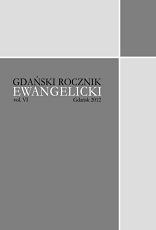(Wokół Stołu Pańskiego – sakramentalne dziedzictwo Reformacji
Around the Lord’s Table – The Sacramental Heritage of the Reformation
Author(s): Jerzy SojkaSubject(s): Christian Theology and Religion
Published by: Parafia Ewangelicko-Augsburska (Luterańska) w Gdańsku-Sopocie
Keywords: Lord’s Supper; Ecclesiology; Ethics; Reformation; LWF
Summary/Abstract: The Lutheran understanding of Lord’s Supper, formed in course of the 16th century arguments, is an important heritage present in today’s reflection of Lutheranism worldwide. Its main outline can be observed based on the most commonly acknowledged Symbolical Books: Luther's Small Catechism and Augsburg Confession, as well as Martin Luther’s early sermon The Blessed Sacrament of the Holy and True Body of Christ, and the Brotherhoods (1519). Among them are: the Lord’s Supper as nota ecclesiae (Mark of the Church), confirmation of body and blood’s presence in bread and wine, salvation as benefit of the sacrament, as well as communion built among those approaching the sac¬rament. In the reflection of the Lutheran World Federation (LWF), the biggest confessional organisation of Lutheranism, Lord’s Supper as nota ecclesiae (Augsburg Confession, art. VII) has a special significance. This article shapes LWF’s ecclesiological self-understanding (introducing pulpit and altar fellow¬ship in LWF, LWF as a communio of churches). The unity model from art. VII also influences Lutheran ecumenical engagement (the model of unity in reconciled diversity, Leuenberg Agreement). The LWF also started a debate on sufficiency of the notae ecclesiae from art. VII, which were also an important argument in the ongoing debates (e.g. concerning worship). The interpretation of body and blood’s presence in the sacrament is a challenge for LWF’s theological reflexion, while remaining a reference point defining the meaning of a sacrament (e.g. in the context of mission and diaconia). In the LWF’s debate, as sacrament’s benefits, next to salvation, appear: communion, strengthening to everyday life of a Christian, healing. Reflexion on the Lord’s Supper became also an impulse for ethical consideration, both in context of unity of the church (the problem of apartheid in Lutheran churches of the Republic of South Africa), and critical view of economic ethics.
Journal: Gdański Rocznik Ewangelicki
- Issue Year: 2012
- Issue No: 6
- Page Range: 197-211
- Page Count: 14
- Language: Polish

